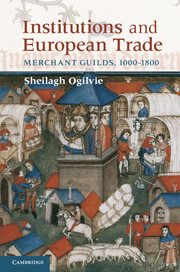Crossref Citations
This Book has been
cited by the following publications. This list is generated based on data provided by Crossref.
Prufer, Jens
2012.
Business Associations and Private Ordering.
SSRN Electronic Journal,
Prufer, Jens
2012.
Business Associations and Private Ordering.
SSRN Electronic Journal,
Hadfield, Gillian K.
and
Weingast, Barry R.
2013.
Law without the State.
Journal of Law and Courts,
Vol. 1,
Issue. 1,
p.
3.
Go, Sabine C. P. J.
2013.
The Amsterdam Chamber of Insurance and Average: A New Phase in Formal Contract Enforcement (Late Sixteenth and Seventeenth Centuries).
Enterprise and Society,
Vol. 14,
Issue. 3,
p.
511.
Hillmann, Henning
2013.
Economic Institutions and the State: Insights from Economic History.
Annual Review of Sociology,
Vol. 39,
Issue. 1,
p.
251.
2014.
Environmental Markets.
p.
92.
Pezzolo, Luciano
2014.
The Cambridge History of Capitalism.
p.
267.
Baena Zapatero, Alberto
and
Lamikiz, Xabier
2014.
Presencia de una diáspora global: comerciantes armenios y comercio intercultural en Manila, c. 1660-1800.
Revista de Indias,
Vol. 74,
Issue. 262,
p.
693.
Persson, Karl Gunnar
2014.
The Cambridge History of Capitalism.
p.
225.
larrain, maria jose
and
Prufer, Jens
2014.
Business Associations, Lobbying, and Endogenous Institutions.
SSRN Electronic Journal,
Ahlstrom, David
and
Ding, Zhujun
2014.
Entrepreneurship in China: An overview.
International Small Business Journal: Researching Entrepreneurship,
Vol. 32,
Issue. 6,
p.
610.
STASAVAGE, DAVID
2014.
Was Weber Right? The Role of Urban Autonomy in Europe's Rise.
American Political Science Review,
Vol. 108,
Issue. 2,
p.
337.
Bell, Adrian R.
Brooks, Chris
and
Moore, Tony K.
2014.
The credit relationship betweenHenryIIIand merchants ofDouai andYpres, 1247–70.
The Economic History Review,
Vol. 67,
Issue. 1,
p.
123.
Ahlstrom, David
and
Ding, Zhujun
2015.
Developments in Chinese Entrepreneurship.
p.
1.
Wahl, Fabian
2015.
Participative Political Institutions and City Development 800-1800.
SSRN Electronic Journal,
Wahl, Fabian
2015.
Political Change and Economic Development. Evidence from the Rise of Participative Political Institutions in the Late Medieval German Lands.
SSRN Electronic Journal,
Leonard, A. B.
and
Pretel, David
2015.
The Caribbean and the Atlantic World Economy.
p.
1.
Erikson, Emily
and
Assenova, Valentina
2015.
Chartering Capitalism: Organizing Markets, States, and Publics.
Vol. 29,
Issue. ,
p.
1.
Geloso, Vincent
2015.
Deirdre Mccloskey, Kirznerian Growth and The Role of Social Networks.
Economic Affairs,
Vol. 35,
Issue. 3,
p.
453.
Puttevils, Jeroen
2015.
‘Eating the bread out of their mouth’:Antwerp's export trade and generalized institutions, 1544–5.
The Economic History Review,
Vol. 68,
Issue. 4,
p.
1339.



